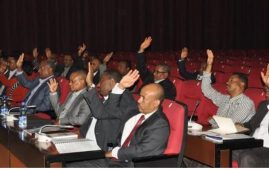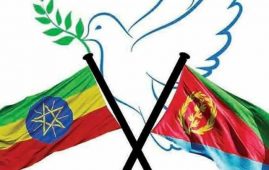(By: Merkeb Negash)
This is a response to Ato Nahusenay Belay’s “Get rid of the Bad Boy” article published last week.
First of all, I would like to thank and appreciate Ato Nahusenay for his detailed and rigorous analysis of the security challenges of Isayas’s Eritrea. My reservations lie on the main point and the way forward: Getting rid of the bad boy. Let me explain why getting rid of the mad dog of Asmara by and in itself is neither a solution nor our strategic concern. I will try to deal with the issue 1, by explaining how the mere removal of Isayas wouldn’t solve our problems at home and how it is costly economically and politically; and 2, by elucidating how invading Eritrea would herald the creation of another Somalia in the north.
First, without setting our house right first, the mere removal of the regime in Asmara wouldn’t weaken nor neutralize the various insurgents at home. Eritrea has never been, and is not, the only country that works round the clock to destabilize Ethiopia. Even before the birth of Eritrea in 1991/93, there had been, and still are, many other countries that have always been security challenges for Ethiopia. The age-old role of Egypt in destabilizing and weakening Ethiopia, the Somali irredentism, and Albashir’s dream of exporting Islam sponsored by some Arab states are but few of the historical challenges Ethiopia had to face for decades, if not centuries. In fact, these countries were the midwifery of the birth of the state of Eritrea. Hence, getting rid of the Eritrean dictator would merely mean the reduction of a single actor/proxy that contemplates to destabilize Ethiopia. As the foreign Policy document of FDRE rightly puts it: “There is no point in trying to pursue a foreign relations and national security policy to be implemented externally without a major and effective in-country effort to realize our vision of development and
democratization”. As a result, our strategic area of engagement should be at home. We can start by initiating a dialogue with the various insurgents at home and abroad. In case this doesn’t work, making their agenda void and outdated by addressing the socio-economic and political demands of their respective ‘constituencies’, if any, should be the primary task. Without addressing some age-old and outstanding demands at home, the mere removal of a single sponsor will not weaken these insurgents nor will it deprive them of another sponsor.
Moreover, a full-fledged invasion of Eritrea would be costly, inter alia, economically and socially. The remarkable socio-economic strides made in the last decade should not be halted to kill an already dead mad dog nor is it wise to re-channel our economic and human resources to get rid of a weak enemy. Socio-economic development by and in itself is an awesome deterrence. An economically strong Ethiopia would mean the death of any insurgency at home, at least to some extent, and a country feared and respected by its enemies abroad. Economic progress is the key to address any threat posed by insurgencies. Christopher Clapham (1990) in his “The Political Economy of Conflict in the Horn of Africa” remarkably elucidates how “economic
marginalization provides guide than ethnicity, political exclusion or even economic exploitation to the incidence of insurgency” in the horn of Africa. Indeed, it is the economy, stupid!
In addition, the human cost of another war is not worth paying. We have had enough of that throughout our history. I, more than anyone else, have witnessed the cruelty of Isayas and war when I was a little child who couldn’t even discern what was going on. I barely survived the Aerial bombardments of the Eritrean regime when I was only ten. I have witnessed the horrors of war and have lost beloved ones. I am not being clouded by my experiences and idiosyncrasies nor am I that naive to advocate the un-necessity of war what so ever. I believe sacrifices need to be paid if need be. As the ‘perra bellum’ doctrine dictates, you should prepare for war if you want peace. However, a full-fledged war should be used as a last resort and a final arbiter of rivalry if and only if other mechanisms of achieving relative peace didn’t work and if the cost of not going to war outweighs the gains. I don’t see the occurrence of either of these conditions.
Secondly and more importantly, invading Eritrea at this time would herald the birth of ‘Another Somalia’ in the North. The people of Eritrea are still the prisoners of the colonial narratives and their born-again colonizer WediAfom. Surprisingly and unfortunately, Isayas’ project of writing “Otherness” is working well. Isayas seems to have read and effectively applied the Postmodernist perspective of ‘truth’, ‘reality’, ‘narrative’, and ‘identity’. David Campbell, a prominent postmodernist thinker, in his book “Writing Security: US Foreign Policy and the Politics of Identity” sets out how interpretations of danger have worked, and continue to work, to establish the identity of states. Campbell defines Foreign policy as the policy of making things foreign. Thus, far from being an expression of a given society, foreign policy constitutes state identity through the interpretation of danger posed by others. Working within the more general problematic of identity/difference, foreign policy, as the policy of making things foreign, helps establish the boundaries of inside/ outside, domestic/ foreign, civilized/ barbaric etc. This project of constructing state identity starts with writing “Otherness”. The ‘Other’ is always a danger, and is tagged with attributes like ‘Enemy’, Barbaric’, ‘Cruel’, ‘Villain’ etc while ‘We’ is depicted as ‘Good’, ‘Civilized’, ‘Kind’, ‘Brave’ and so on.
The very foundation of the Eritrean identity is established in such a way. Eritrea’s project of ‘writing otherness’ goes back to the Italian colonization in which the colonizers effectively narrated and created a ‘civilized’, ‘neat’, ‘urban’ Eritrean identity vis-à-vis a ‘barbaric’, ‘dirty’, and ‘rural’ Ethiopian identity. This narrative continued during the armed struggle where an Eritrean was dipicted as ‘brave’, ‘kind’, and ‘civilized’ while the Amharas were depicted as ‘barbaric’, and ‘cruel’ and the Agames as ‘uncivilized’, ‘rural’ and of ‘lower-caste’. When Isayas took office in 1991/93, the Politics of theorizing identity and writing Security became institutionalized. The ‘Other’ i.e. Ethiopia served as the fundamental pillar of the survival of the Eritrean state/identity. He started with demolishing Ras Alula’s statue and deconstructing everything that Eritrea shares with Ethiopia. In fact, Isayas had tried to create a new language other than Tigrigna back on Sahel. It was not an easy task for a country which shares everything in common with the ‘Other’. Hence, the need for a bolder move: a war with the ‘Other’. The war with Ethiopia might have been a failure politically and economically; in terms of writing an Eritrean identity, however, it is anything but a failure. It suffices to read and listen to the views of Eritreans in the social networks. All their movies share two characters: a cruel and barbaric Amhara soldier, and a rural and uncivilized Agame maid. Their songs are not any different; they are congested with emotive laden terminologies that narrate how being an Eritrean is a blessing and being an Ethiopian a curse. The in/famous songs of Yohannes Tikabo AKA Wedi Tikabo are typical examples in this regard. In a track titled ‘Wore’, Wedi Tikabo remarkably- albeit inaccurately- narrates as follows:
” In an attempt to take us back to the colonial era, a cruel and barbaric era where we had been brutally ruled for generations, the barbarians are contemplating day and night to colonize us again through various mechanisms and forms” ( A rough translation of mine)
This track might simply seem a gift for Isayas by a single supporter. Unfortunately, though, this view is shared by the majority of Eritreans. (By the way, it is widely rumored in Asmara that Wedi Tikabo’s lyrics are written by the Big Brother.)
The motive behind the recent mass militarization, among other things, could be providing a coercive apparatus for the Eritrean mass who truly believe in the identity Isayas has constructed. Therefore, it doesn’t require being a prophet to imagine the consequences of invading Eritrea where everyone is equipped with an ideological and actual Kalashnikov! Somalia would no longer serve as a textbook example of anarchy, violence and horror. This is why I am arguing that sending Ethiopian troops to Asmara is anything but wise.
To conclude, with a people equipped with an ideological and actual Kalashnikov in Eritrea, an absence of a viable and strong successor- be it an opposition or within the PFDJ, the already fragile security complex of the horn of Africa, and some outstanding demands by some sections of the Ethiopian society, a full-fledged invasion of Eritrea would be jumping from the frying pan to the fire! As of me,
maintaining the statuesque vis-à-vis Eritrea and waiting for the bad boy to dig his own grave by providing every single catalyst short of war, setting our home right, and focusing on our socio-economic development should be the strategic areas that the GOE should work on.
**********
The author, Merkeb Negash, is an author in this blog. He is a Lecturer, at Department of Governance and Development Studies of Jimma University, and can be reached at elroenegash@ gmail.com
Check the Eritrea archive for related posts.






1 Comment on this post
Comments are closed.
Leave a Comment